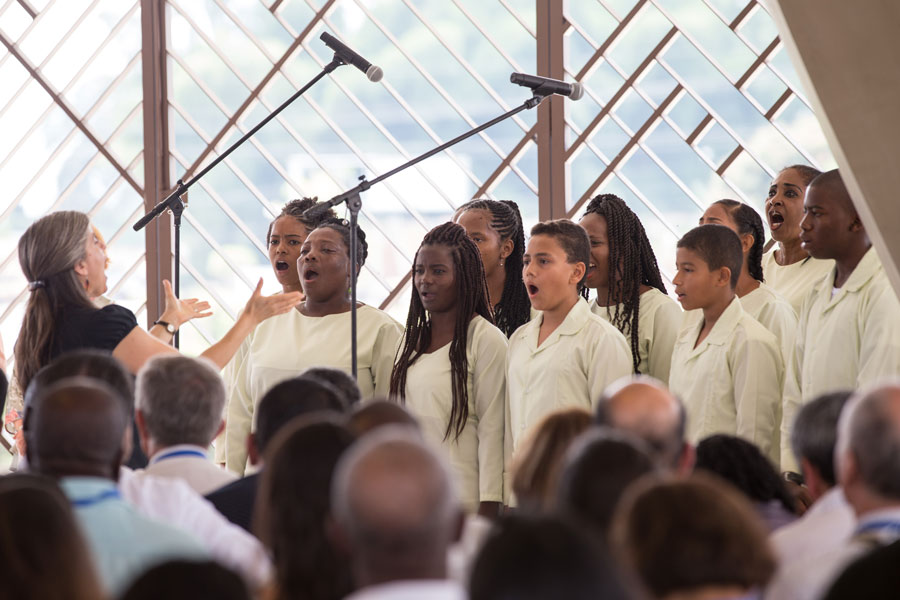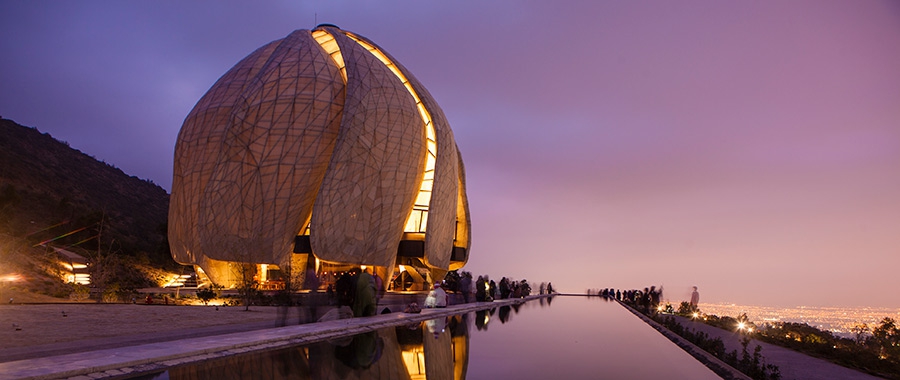The views expressed in our content reflect individual perspectives and do not represent the authoritative views of the Baha'i Faith.
The Baha’i world works daily to increase the number of Baha’i Houses of Worship in countries, cities and villages across the globe.
Why build such temples? Because the excitement and joy of such an endeavor could not be more palpable. Baha’i Houses of Worship are dedicated centers for worship—for everyone, not just the Baha’is—and they offer spiritual hubs for activities that include the entire community, whether local, national or international. Such spaces are essential for the life of a community, its expansion, and unification.
In his Most Holy Book, Baha’u’llah called on the peoples of the world to build:
… houses of worship throughout the lands in the name of Him Who is the Lord of all religions. Make them as perfect as is possible in the world of being, and adorn them with that which befitteth them, not with images and effigies. Then, with radiance and joy, celebrate therein the praise of your Lord, the Most Compassionate. Verily, by His remembrance the eye is cheered and the heart is filled with light. – pp. 29-30.
Abdu’l-Baha further elaborated:
The wisdom in raising up such buildings is that at a given hour, the people should know it is time to meet, and all should gather together, and harmoniously attuned one to another, engage in prayer; with the result that out of this coming together, unity and affection shall grow and flourish in the human heart. – Abdu’l-Baha, Selections from the Writings of Abdu’l-Baha, pp. 94-95.
So far the global Baha’i community has established eight Continental Houses of Worship—in each of the world’s continents around the world: North, Central and South America, Africa, Europe, Asia, Australia and the Pacific Islands.
I’m a singer, and I’ve had the profound privilege of chanting sacred verses in four of these Continental Houses of Worship.
I will never forget how my voice continued to carry long after I’d ended a phrase. The echo would bounce from wall to wall, corner to corner, and slowly fade out before I could move to the next phrase. No matter which House of Worship I chanted in, the sound would reverberate just the same. I had to learn, over time, to take things slow, to really use this time to meditate, focus on my breath and reflect on the sacred words that I was chanting.

A choir sings a passage from the Baha’i writings inside the central edifice of the recently opened Baha’i House of Worship in Agua Azul, Colombia. (courtesy of Bahai.org)
In Baha’i Houses of Worship there is always a reverent silence. If a pin dropped, you’d definitely hear it. All Baha’i Houses of Worship have nine sides, each with an entrance—which symbolizes the different religious paths that all lead to the one true God. All Baha’i Houses of Worship have a central dome, as well, adorned with calligraphy that says “Ya Baha’u’l-Abha,” which translates to “O Thou the Glory of the Most Glorious.” Standing under this magnificent high ceiling, praying with countless other souls from all walks of life, you can really feel a sacred presence.
I’ve heard groups of voices, choirs, chant the sacred writings in different languages depending on which House of Worship I was in, all praising the creator and the unifying teachings of Baha’u’llah. In every House of Worship I heard melodies uniquely relevant to that continent, capturing sounds, intonations, and styles specific to the regions, ethnic and indigenous groups that surrounded the Temple. It was almost as though these sacred words and melodies fit only in these spaces, that the full effect could not be reached in any other space, anywhere else in the world.
If you want to experience the mystical, numinous presence of the Creator, find a Baha’i House of Worship and go pray or listen to music there. You’ll find at least one of those Houses of Worship on every continent—and increasingly, you’ll begin finding them in more and more localities, as the global Baha’i community continues to build them in many different localities. In the next essay in this series, we’ll find out more about the new local Baha’i Houses of Worship, how the beautiful music of the human voice fills them with song, and what they mean for the progress of humanity.
















Comments
Sign in or create an account
Continue with Googleor